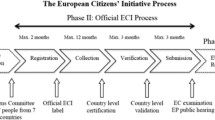Abstract
From June 26 to 27, the workshop “Ironists, Reformers, or Rebels? The Role of the Social Sciences in Participatory Policy Making” took place at the Collegium Helveticum of the UZH/ETH in Zurich. The organisers’ motivation was the apparently missing involvement of social scientists in public engagement processes. This impression persists because, while social scientists often observe public debates or develop participatory methods for public policy-making, they rarely take part in those processes themselves. A closer look at ethics commissions, expert committees or public hearings concerned with science and technology issues shows natural scientists, physicians, lawyers and the occasional philosopher. Sociologists, anthropologists and other social scientists, on the other hand, are often not involved. Because of this imbalance, the organisers’ aim was to bring together scholars and researchers from different areas of the social sciences to consider the role of their disciplines in public policy making. This article will focus on some of the ideas about specific roles of social scientists in participatory policy-making, discussed at the workshop, and their implications and give a commentary on some future prospects of the social sciences.
Similar content being viewed by others
Notes
As it had happened recently when the German biologist Ulrich Kutschera wrote an answer to Florian Mildenbergers essay “Steter Stachel fördert die Evolution” (http://www.laborjournal.de/editorials/LJ_08_07_neo.pdf). See http://www.laborjournal.de/editorials/317.html.
Kutschera (University Kassel) had been asked to respond to Mildenbergers article, in which the medical historian Mildenberger (LMU Munich) had presented his thesis: evolutionary research got some impulse from vitalists and creationists, too. Because those had opposed evolutionary theory, evolutionary theorists were challenged to do more research to find better proofs.
Instead of answering to this thesis, Kutschera spoke rather generally about humanities and their disability to work with “real existierenden Dingen” and finished with “Nichts in den Geisteswissenschaften ergibt Sinn außer im Lichte der Biologie”.
All quotations are from the particular workshop slides.
References
Abels G, Bora A (2004) Demokratische Technikbewertung. Trancript, Bielefeld
Burchell K (2008) Just a helping hand? Stakeholder perspectives on the role of social science in the UK ‘participatory turn’ in science and technology. Slide presentation at the workshop “Ironists, reformers or rebels? The role of the social sciences in biomedical policy making”, Zurich, 26–27 June 2008
Radstake M (2008) Mediating a societal agenda for genomics. Reflections on doing the DNA-dialogues. Slide presentation at the workshop “Ironists, reformers or rebels? The role of the social sciences in biomedical policy making”, Zurich, 26–27 June 2008
Author information
Authors and Affiliations
Corresponding author
Rights and permissions
About this article
Cite this article
Jung, C. Towards more confidence: about the roles of social scientists in participatory policy making. Poiesis Prax 6, 125–129 (2009). https://doi.org/10.1007/s10202-008-0067-x
Published:
Issue Date:
DOI: https://doi.org/10.1007/s10202-008-0067-x



